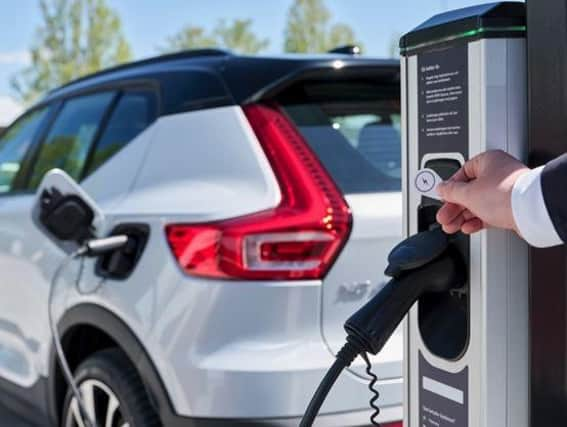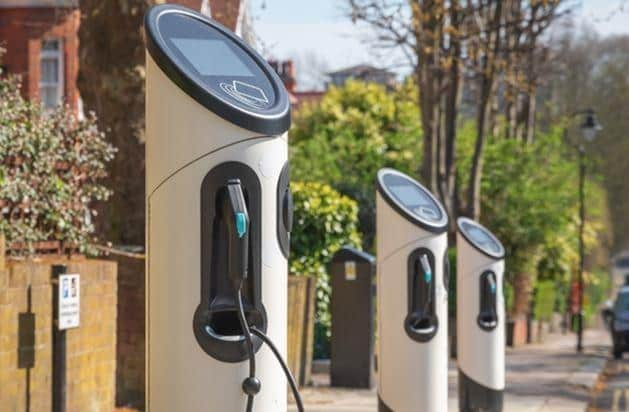Switching to an electric car: Where can I charge it? How much does it cost? How long does it take to charge?


New research has found that more than half of UK drivers* are keen to make the switch from petrol to electric, but confusion around charging an electric vehicle (EV) continues to be an obstacle. To help ease the transition, a Crawley car retailer provides their top tips and advice for drivers to better understand how charging an electric car works.
Nick Jones, from Harwoods Crawley on Gatwick Road, said: “Despite sales of electric cars rising annually, there continues to be apprehension and misunderstanding around charging an EV – with many drivers unsure about the costs, time and etiquette required to do so.
Advertisement
Hide AdAdvertisement
Hide Ad“Below are the three most frequently asked questions from Crawley drivers who are unsure about the technology getting them from A to B – without running out of charge along the way.”


Where can I charge it?
“A common worry we find Crawley drivers have is finding themselves low on battery midway through a journey with nowhere to charge. While charging at home is a great way of ensuring your car is always good to go, there are plenty of options for when you’re out and about, too – ideal for people living with on-street parking.
“If you’re out on the road, there are currently more than 42,000 public charging points across the UK, many of which are at supermarkets, shopping centres, public car parks and service stations**, making it easier than ever to charge your car while you go about your weekly business.”
How much does it cost?
“Like any new gadget, there is naturally uncertainty around how much and how long something takes to charge – especially with the cost of living rising.
Advertisement
Hide AdAdvertisement
Hide Ad“While many public places offer free charging, it’s worth remembering that these public hotspots often have time limits or require in-store purchases. In comparison, local tourist hotspots, such as museums and zoos, now feature free charging as an incentive for visitors – so your car can be charging while you enjoy the attraction.
“People can become confused about the speed of the different charging points. The speed at which your car charges will vary at these different locations, depending on the type of chargers they offer. Bigger supermarket chains, such as Tesco and Aldi, offer fast 7kW or 22kW chargers. Ultra-rapid chargers – commonly found at motorway services – are the fastest method of charging, which is great for those long journeys. It’s worth remembering, however, that these motorway charging points mirror the prices of fuel at a motorway service station, so are one of the most expensive places to charge.
“It’s also worth considering your charging etiquette, especially when using free chargers, because they can often be in high demand. A general rule is to charge only what you need to get to where you’re going.
“To help you find the best places to charge, there are plenty of apps, including the Volvo Cars smartphone app, which can show you the best local charging points or those along your journey.”
How long does it take to charge?
Advertisement
Hide AdAdvertisement
Hide Ad“We know for many busy drivers, the worry of being stuck waiting ages for your car to charge can be off-putting and time consuming.
“While there’s no one-size-fits-all answer to how long your car will take to charge – it depends on battery size, how much electrical current it can handle, the speed of the charge point used, plus other factors such as temperature – rapid charge points, which can be found at many public charging spots, are generally the quickest available.
“A 7kW charger has the capacity to fully charge a compatible EV with a 40kW battery in four to six hours, while a 22kW charger will take only one to two hours***. It’s important to remember that no matter the power of the charge point, your car will only draw in as much power as its on-board charger allows, so the charging time may still be longer.
“Slow chargers are generally reserved for use at home, where cars will be parked for longer periods of time. Charging an EV with a 40kW battery to full via a 3kW charger can take up to 15 hours**** – making it an ideal option if plugged in overnight.
Advertisement
Hide AdAdvertisement
Hide Ad“Typically, a pure electric Volvo car will charge from 10% to 80% in just over half an hour using a rapid charger***** – the perfect amount of time to do your food shopping, grab a coffee or enjoy a Swedish fika coffee break!”
For further information about Harwoods Crawley, go to www.harwoods.uk.com/volvo, email [email protected] or call 01293 901730.